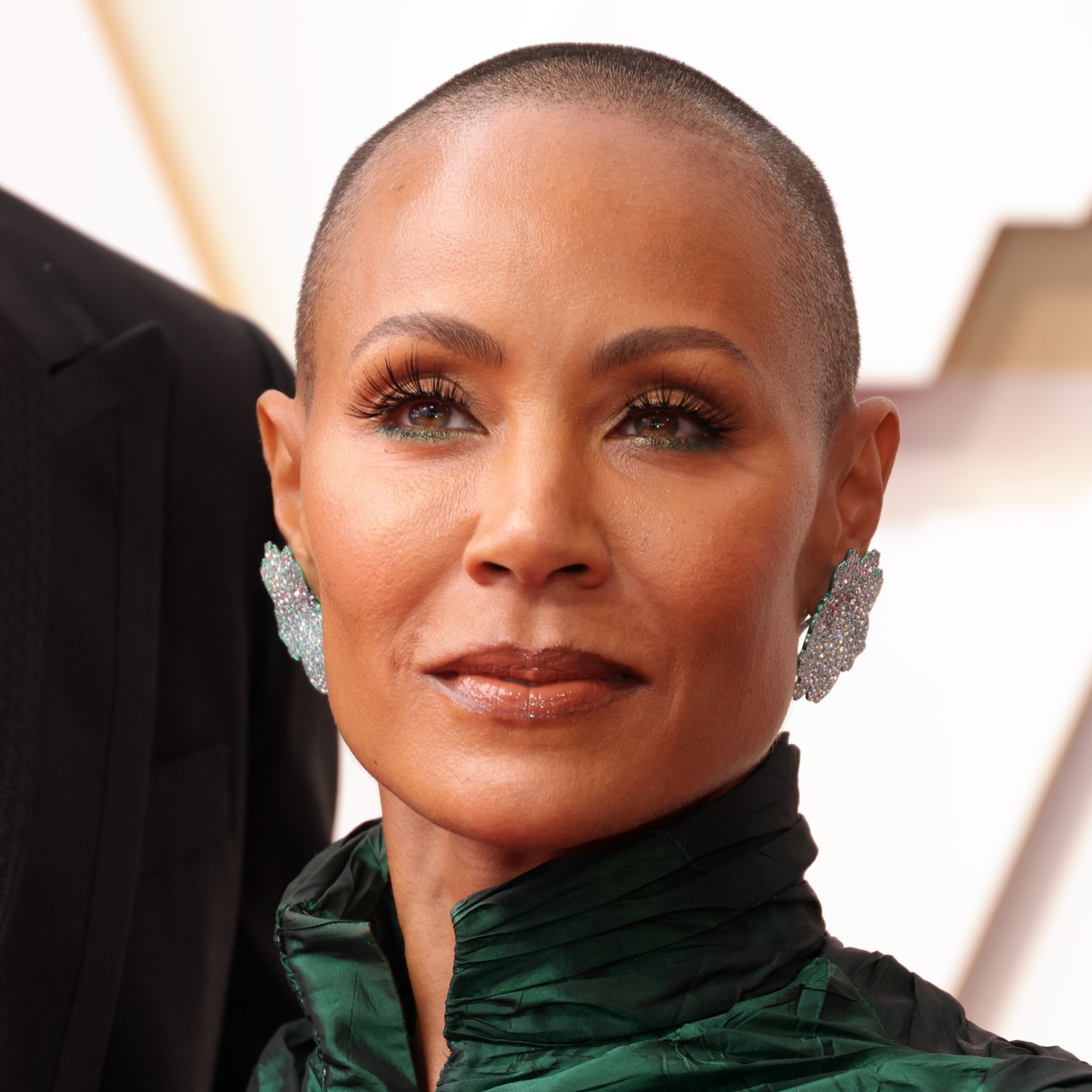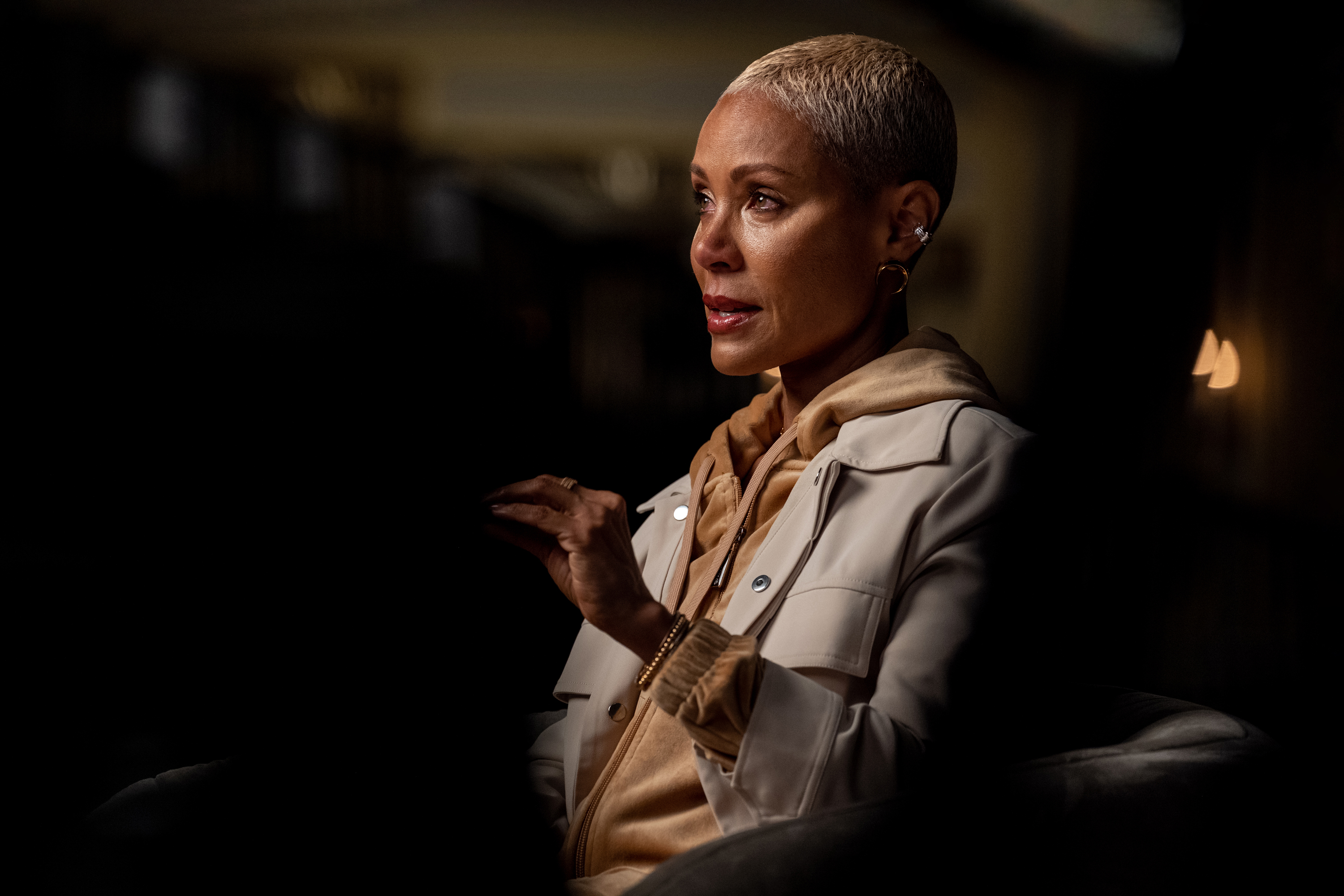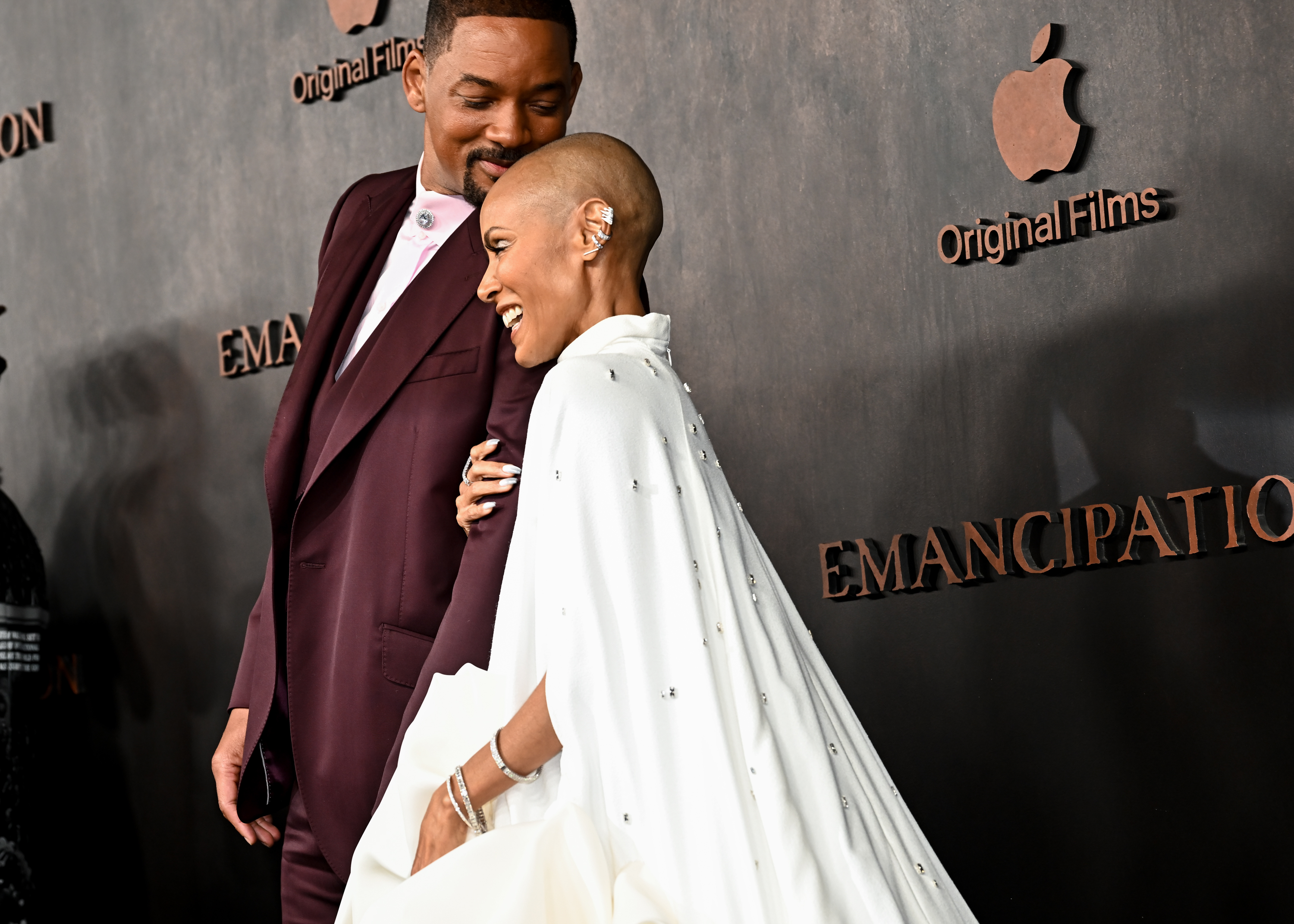
Content warning: The following story includes several descriptions of suicidal ideation.
Let’s make it clear right off the top: Jada Pinkett Smith is more than her marriage to Will Smith. She is more than her two children, Jaden and Willow (and her stepson, Trey). She is more than the rampant and incessant headlines about her: The entanglement. The Oscars slap. Her alopecia.
Pinkett Smith is an actress, author, musician, storyteller—but, most of all, she is a woman long in search of herself and her self-worth, a journey she outlines in her book, Worthy, which was released on October 17. The book opens as Jada’s 40th birthday approaches; on paper, her life was perfect, but secretly, Jada pens, that at the time she was looking for a cliff she could drive over to commit suicide and make it look like an accident. In her own words, she had been a high functioning depressive for so long; “The gilded cage I had built felt like a prison,” she writes in Worthy, “and I had walked in here on my own.”
Marie Claire: Why write Worthy, and why now?
Jada Pinkett Smith: While I was on my journey, I really wished I had more stories that represented what I was going through. In a really deep way, I think it’s still taboo for women to share the depths of their journey, and I was like, Well, shoot, you’ve been through the gauntlet, Jada. What else could people say about you? You’ve been called everything in the book. You’ve been villainized. You have nothing to lose. Have the courage to do the thing you hoped would represent your journey. Leave some little bread crumbs for other women in their process. That’s really why I wanted to write it, because our journeys as women, on our search for self-worth in a world that is constantly telling us that we’re only worthy depending on the man we’re attached to, or how we mother—all these things outside of ourselves that validate ourselves—I really wanted to give an extensive look into my journey as a way for others to reflect on theirs and feel seen.
MC: Finding self-worth is an internal process, but does society continually stoke the flame of unworthiness, especially for women?
JPS: I think so. We’re living in a patriarchal construct that’s constantly saying that a woman is not as strong, not as smart, not as worthy. That’s just not true. There’s a lot of work that we constantly [do], a heavy lift, to get us to a place that we really understand that—not just a theoretical understanding, but something in our DNA and something that lives in our spirit and in our heart that we can walk with. We have to be the constant reminder to ourselves of our own self-worth. And that means something different to every woman.
MC: You write that “Hollywood never seemed to know how to tame me, and I didn’t want to be tamed.” Why do we have such a problem with a woman, and especially a young woman, confidently saying no?
JPS: I think that in the patriarchal construct, 'woman' is here to please whatever the masculine desire is. Anytime we go against that, you’re going to be considered a bitch. You’re going to be considered difficult. It’s really kind of breaking that idea that a woman is here to be at the beck and call of a man’s desire, and any way that he sees. And that comes in extreme forms and very subtle forms.

MC: So often, women seem to be defined not by who they are, but by their titles: wife, mom, daughter, sister, friend. Especially a famous woman such as yourself, married to a famous man, and in a famous relationship—your identity is in so many ways wrapped up in someone or something else. But in your own words, who is Jada?
JPS: The way I see myself now is a child of divine source. That’s what I am, first and foremost. I really had to get in contact with that and really see my self-worth, even outside of being Jada. It’s a long journey to get there, and it surely isn’t for the faint of heart. It’s the only thing to be doing. While we’re doing everything else, we abandon that particular aspect.
MC: If you could speak to yourself now, at your lowest point, contemplating suicide around your 40th birthday, what would you say to her?
JPS: I would tell her, 'yes, there is something that must die, but it’s not you.' This thing called life, this earth that we are inhabiting, is a university, and we all have our curriculum. Once I started adhering to the curriculum of dissolving false beliefs, understanding that Oh, I’m here to learn how to love myself and love others—and with that just comes with a lot of things I had to learn to unlearn. I think my biggest lesson and that this book has taught me, and life continues to teach me, is I'm a student of life. And the gig is just about learning, being humble, and having a lot of humility so I can receive that which is necessary for me to learn and, in the process, just loving the process, and loving myself and others along the way.
MC: What does it feel like to now be on the other side of worthiness? What does it feel like to fully accept and love yourself as you now do?
JPS: Freedom. To me, that’s what authentic freedom is. We think freedom is about doing whatever we want to do; that’s whimsical freedom. Real freedom for me is having full acceptance, being able to really stand in my skin, knowing who I am, no matter what anybody has to say, no matter what is happening in the world, and really feel good. I wake up every morning and I’m glad to be me—finally.
MC: Far before the chapter towards the end of the book about the Oscars incident, you write that your love language is protection. Do you think the Oscars incident is an example of Will speaking your love language, albeit in an unexpected way, and in front of millions? You write yourself in the book, correctly, that “women of color are damn near never defended.”
JPS: That moment was really complicated. And there’s so much to that moment. I think I would have to wait for Will to share his aspect of that journey to really answer that question thoroughly, because it’s a complex one.

MC: How can we do better, as the dedication page says, for your daughter, and your daughter’s daughter?
JPS: We have to really learn how to embrace our journeys in a real way so we can embrace each other in a real way that helps us embrace our daughters in a real way. Our daughters are watching us. They are reflecting back to us paths we’ve taken. If we can reconcile those paths we’ve taken, we can help them walk those paths. We can’t tell them how to walk it, but we can surely be here as a lifeline—but if we have shame and we have guilt around paths we’ve walked and we have not made peace, we have not healed, we’re going to reject our daughters and reject one another, and that’s what I see all the time. That’s what real empowerment is—when we can really have full acceptance of it all.
MC: You are 52, and you’ve done a whole lot in those first 52 years. What do you hope for in the next 52?
JPS: Man, I just hope to keep learning and enjoying life in my learning. There was so much life I didn’t enjoy. I was just in such a dark place for a really long time. Nothing’s wasted, but I do feel like I’ve had so many beautiful moments I couldn’t embrace because of where I was sitting…I spent so much of my time in a deep depression; for this next half, I want to just keep my eye on joy.
This interview was edited and condensed for clarity.







